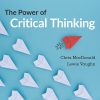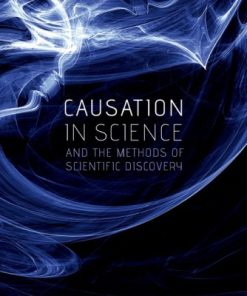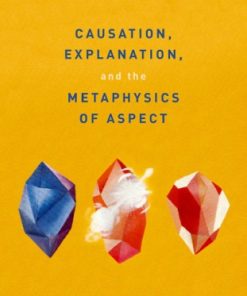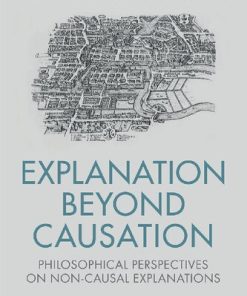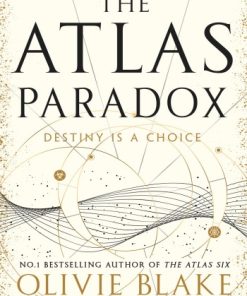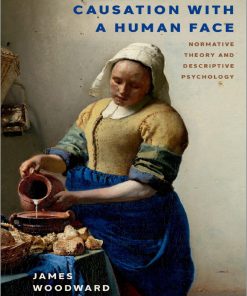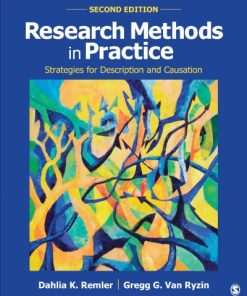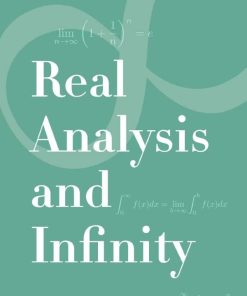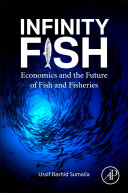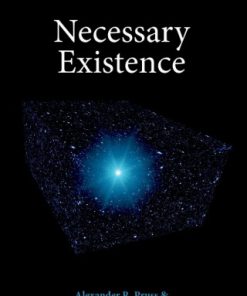Infinity Causation and Paradox 1st edition by Alexander Pruss 0192538284 9780192538284
$50.00 Original price was: $50.00.$25.00Current price is: $25.00.
Infinity, Causation, and Paradox 1st edition by Alexander R Pruss – Ebook PDF Instant Download/DeliveryISBN: 0192538284, 9780192538284
Full download Infinity, Causation, and Paradox 1st edition after payment.
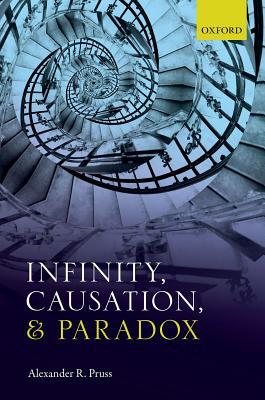
Product details:
ISBN-10 : 0192538284
ISBN-13 : 9780192538284
Author : Alexander R Pruss
Infinity is paradoxical in many ways. Some paradoxes involve deterministic supertasks, such as Thomson’s Lamp, where a switch is toggled an infinite number of times over a finite period of time, or the Grim Reaper, where it seems that infinitely many reapers can produce a result without doing anything. Others involve infinite lotteries. If you get two tickets from an infinite fair lottery where tickets are numbered from 1, no matter what number you saw on the first ticket, it is almost certain that the other ticket has a bigger number on it. And others center on paradoxical results in decision theory, such as the surprising observation that if you perform a sequence of fair coin flips that goes infinitely far back into the past but only finitely into the future, you can leverage information about past coin flips to predict future ones with only finitely many mistakes. Alexander R. Pruss examines this seemingly large family of paradoxes in Infinity, Causation and Paradox. He establishes that these paradoxes and numerous others all have a common structure: their most natural embodiment involves an infinite number of items causally impinging on a single output. These paradoxes, he argues, can all be resolved by embracing ‘causal finitism’, the view that it is impossible for a single output to have an infinite causal history. Throughout the book, Pruss exposits such paradoxes, defends causal finitism at length, and considers connections with the philosophy of physics (where causal finitism favors but does not require discretist theories of space and time) and the philosophy of religion (with a cosmological argument for a first cause).
Infinity, Causation, and Paradox 1st Table of contents:
1: Infinity, Paradox, and Mathematics
1. Paradox and Causal Finitism
2. Some Mathematical and Logical Notes
3. Modality
3.1 Metaphysical possibility and necessity
3.2 Rearrangement principles
3.2.1 Defeasibility
3.2.2 causal powers
4. Finitism: An Alternate Hypothesis
4.1 Time and finitism
4.2 Non-causal paradoxes: An advantage?
4.3 Mathematics: A disadvantage
4.3.1 infinitely many primes
4.3.2 potential infinity
4.3.3 ∗if-thenism
4.4 Future infinities
5. ∗Defining the Finite and the Countable
5.1 The finite
5.2 Acceptable models for the axioms of arithmetic
6. Evaluation
Appendix: ∗Counting Future Things
2: Infinite Regresses
1. How to Violate Causal Finitism
2. Infinite Causal Regresses
3. Type (i): Uncaused Regresses
3.1 Viciousness
3.2 Vicious regresses and the Hume–Edwards Principle
3.3 Regresses and explanatory loops
4. Type (ii): Causation Passing through Infinitely Many Steps
5. Type (iii): Outside Cause Directly Causing Each Item
5.1 Options
5.2 Regresses with outside overdetermination
6. ∗Analogy with Axiom of Regularity
7. Evaluation
Appendix: ∗Two Kinds of Violations of Causal Finitism
3: Supertasks and Deterministic Paradoxes
1. Introduction
2. Thomson’s Lamp Revisited
2.1 Introduction
2.2 Causal finitism
2.3 Non-standard analysis
2.4 Special Relativity
2.5 Benacerraf ’s solution and the Principle of Sufficient Reason
2.6 Two counterfactuals
2.7 Evaluation
3. Grim Reapers
3.1 Introduction
3.2 Causal finitism
3.3 The absurd conclusion objection
3.4 A rearrangement objection
3.5 The mereological objection
3.5.1 fusion
3.5.2 necessary emergence of organic wholes
3.6 Uncaused lighting
3.6.1 objection
3.6.2 the causal principle is true
3.6.3 is the lamp lighting really uncaused?
3.6.4 a mysterious correlation
3.7 Discrete time
3.8 Evaluation
4. Infinite Newtonian Universes
4.1 An argument against causal finitism and a riposte
4.2 Smullyan’s rod
4.3 The conditional
5. Another Eternal Life
6. Time Travel and Causal Loops
6.1 Grandfathers and togglers
6.2 Time travel and backwards causation without causal loops
7. Evaluation
4: Paradoxical Lotteries
1. Introduction
2. Countably Infinite Fair Lotteries
2.1 Background
2.2 Expected surprise
2.3 A guessing game
2.4 Symmetry
2.4.1 symmetry and lotteries
2.4.2 ∗symmetry and expected utility
2.5 Bayesian manipulation
2.5.1 the paradox
2.5.2 ∗a switchover point?
2.5.3 ∗countable additivity and conglomerability
2.6 Improving everyone’s chances
3. Constructing Paradoxical Lotteries
3.1 Fairness and paradoxicality
3.2 Lucky coin-flip sequences
3.3 What it is to construct a countably infinite fair lottery
3.4 ∗Coin-flips and the Axiom of Choice
3.5 Random walks
4. Objections
4.1 Infinite lotteries and uniform distributions
4.1.1 the problem
4.1.2 response i: no continuous distributions
4.1.3 response ii: measurement of infinite precision data
4.1.1 response iii: the use of the axiom of choice
4.2 ∗A non-normalizable quantum state
4.3 Limitations on our reasoning
5. Evaluation
5: Probability and Decision Theory
1. Introduction
2. Guessing with Finitely Many Errors
2.1 Doing a little better than one can
2.2 A contradiction
2.3 Doing much better than one can
2.4 ∗Construction of strategy guaranteeing at most finitely many errors
2.5 A multipersonal synchronic version
2.5.1 an angelic announcement
2.5.2 an objection and a tweak
2.5.3 ∗making the paradox robust
2.6 A parody?
2.6.1 the story
2.6.2 evaluating the parody
3. Satan’s Apple
3.1 The story
3.2 Synchronic version
3.3 Diachronic version
3.4 Objection: Scores, desires, and promises
3.5 Evaluation
4. Beam’s Paradox
4.1 ∗The mathematical formulation
4.2 ∗Synchronic version
4.3 ∗Diachronic infinite future version
4.4 ∗Diachronic supertask version
4.5 Evaluation of Beam’s paradox
5. Evaluation of Decision-Theoretic Paradoxes
Appendix: ∗Proof of theTheorem from Section 2.1
6: The Axiom of Choice Machine
1. Less Technical Introduction
2. ∗The Axiom of Choice for Countable Collections of Reals
3. ∗Paradoxes of ACCR
3.1 Die-guessing games
3.2 Non-measurable sets
3.3 Banach–Tarski paradox
4. ∗An Argument for ACCR
5. ∗A Choice Machine
5.1 Strange mathematics and paradox
5.2 Coin-flips and Dutch Books
5.3 How to construct a Choice Machine
5.3.1 angels
5.3.2 a four-dimensional machine
5.3.2.1 Making the machine
5.3.2.2 Using themachine
5.3.2.3 Causal infinitism and verifying the machine’s match
5.3.3 a three-dimensional machine
5.3.4 ∗∗is ac needed?
5.3.5 luck
6. Evaluation
Appendix: ∗∗Details of Coin-Toss Rearrangement
7: Refinement, Alternatives, and Extensions
1. Introduction
2. Refinement
2.1 Event and trope individuation
2.2 Histories generated by partial causal relations
2.3 A closer look at Grim Reapers
2.4 Objections to causal finitism involving partial causation
2.5 Absences and omissions
3. Some Competitors to Causal Finitism
3.1 Finitism
3.2 No infinite regresses
3.3 No past infinities
3.4 No infinite intensive magnitudes
3.4.1 the basict heory
3.4.2 some infinite intensive magnitudes
3.4.2.2 Mental life
3.4.2.3 Black holes
3.4.2.4 Particles
3.4.3 huemer’s intensive magnitudes
3.4.3.1 Speed,Thomson’s Lamp, and Hilbert’s Hotel
3.4.3.2 ∗Smullyan’s rod
3.4.3.3 Immaterialminds
3.4.4 evaluation
3.5 No room
4. Why is Causal Finitism True?
4.1 The question
4.2 Some explanatory suggestions
5. Further Extensions
5.1 Causal loops
5.2 Explanatory relations
6. Overall Evaluation
8: Discrete Time and Space
1. Introduction
2. Causal Finitism and Discreteness
2.1 The basic argument
2.2 From discrete time to discrete space?
3. Two Kinds of Discreteness
3.1 Subdivisibility and fixeity
3.2 Refining the Aristotelian picture
3.2.1 an objection to aristotelian discreteness
3.2.2 internal and external discreteness
4. Physics
4.1 An objection to causal finitism
4.2 Causation and physics
4.3 Quantum collapse
4.3.1 some background
4.3.2 causation
4.3.3 back to discrete time
5. Fields and Discrete Space
6. Evaluation
9: A First Cause
1. Introduction
2. An Uncaused Cause
2.1 The quick argument
2.2 Towards a necessary being
2.3 Support for the Causal Principle
2.4 The Kal¯am argument
3. Compatibility withTheism?
3.1 Theism
3.2 Divine motivation
3.3 Divine knowledge
3.4 Divine action
3.5 Limits on metaphysical possibility
4. Evaluation
10: Conclusions
People also search for Infinity, Causation, and Paradox 1st:
alexander pruss infinity causation and paradox
infinite paradox examples
infinity causation and paradox
alexander pruss infinity
infinity causation and paradox pdf
Tags: Infinity, Causation, Paradox, Alexander Pruss, deterministic supertasks
You may also like…
Politics & Philosophy - Anthropology
Causation in Science and the Methods of Scientific Discovery
Politics & Philosophy - Anthropology
Politics & Philosophy - General & Miscellaneous Philosophy
Fantasy - Other Fantasy Fiction Categories
Politics & Philosophy - Major Branches of Philosophical Study
Uncategorized
Research Methods in Practice: Strategies for Description and Causation – Ebook PDF Version
Mathematics - Analysis
Business & Economics - Industries
Infinity Fish : Economics and the Future of Fish and Fisheries Ussif Rashid Sumaila
Politics & Philosophy - European & American Philosophy


